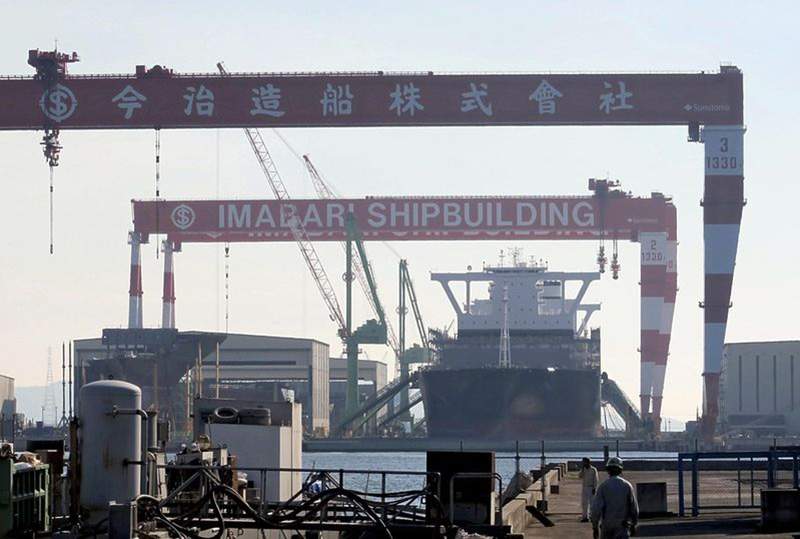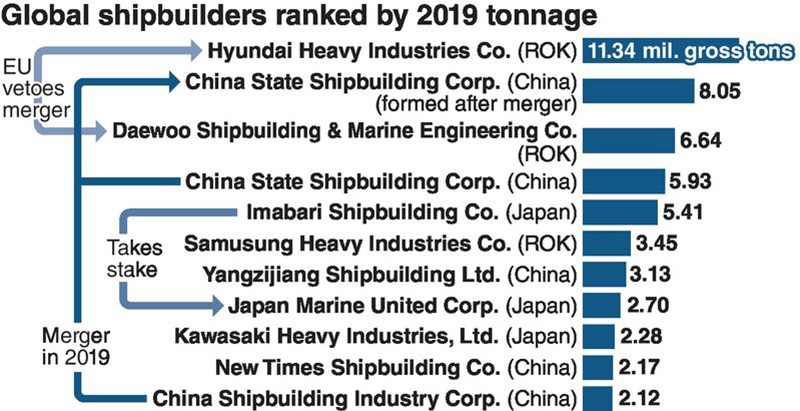
The Marugame Headquarters of Imabari Shipbuilding Co. is seen in Marugame, Kagawa Prefecture, in July 2021.
16:06 JST, January 16, 2022
The struggle for supremacy in the global shipbuilding industry has been thrown into turmoil, with the European Commission rejecting the merger of South Korean giants Hyundai and Daewoo.
Hyundai Heavy Industries Co. is already the world’s largest shipbuilder by tonnage and merging with world No. 3 Daewoo Shipbuilding & Marine Engineering Co. would have created a leviathan of a company. Not only did this raise concerns about competition, but Hyundai and Daewoo also have a combined market share of over 60% for LNG tankers, which have high added value.
European Union antitrust chief Margrethe Vestager, an executive vice president of the EC, referred to the construction of these tankers for liquefied natural gas when explaining the Thursday veto.

“Given that no remedies were submitted, the merger would have led to fewer suppliers and higher prices for large vessels transporting LNG,” she said in a statement.
The huge LNG tanker market is valued at ¥5.2 trillion. These tankers are an important means of transportation in light of the energy security situation in Europe.
Staying afloat
The global shipbuilding industry was hit by the 2008 global financial crisis triggered by the collapse of U.S. investment bank Lehman Brothers, which led to a sharp decline in orders and an industrial recession. As a result, the industry is undergoing reorganization worldwide.
In China, the two major state-owned shipbuilders merged in 2019, creating the world’s second-largest shipbuilder, China State Shipbuilding Corp.
In Japan, Imabari Shipbuilding Co., the country’s largest shipbuilder, took a 30% stake in the nation’s No. 2 firm Japan Marine United Corp. last year, creating a top-tier consortium. Mitsui E&S Holdings Co. and Tsuneishi Shipbuilding Co. also entered into a capital alliance last year.
On the back of Japan’s period of rapid growth in the 1960s, the nation’s shipbuilding industry grew to account for about 50% of the global market in the 1980s. From the 1990s, however, Chinese and South Korean shipbuilders used lower prices to drive Japanese companies into a corner.
The current market share of Japanese shipbuilders has dropped to just over 20%, which has forced the domestic industry to strengthen its competitiveness through reorganization. Further reorganization may be necessary in the future.
Chinese and South Korean shipbuilders have grown through generous government subsidies and financial support. Japan and the EU have filed complaints with the World Trade Organization against South Korea for violating international rules. There are also other clashes among shipbuilders around the world.
An official of a Japanese shipbuilder said the latest EU decision “was good for us since normal competition has been maintained.”
The official added that there is the possibility that the South Korean companies will find a way to realize the merger by shedding some of their businesses.
“Once such a merger is underway,” the official said, “it can’t be stopped.”
Wind in Japan’s sails
Global demand for shipping has been growing with shipbuilding demand also recovering after it temporarily plummeted due to the pandemic. Japan’s shipping companies’ order backlog has recovered to the pre-pandemic level of 2018.
In response to the decarbonization trend, the development of next-generation ships is gaining momentum worldwide. These ships use ammonia or hydrogen as fuel to reduce greenhouse gas emissions.
Shunichi Miyanaga, chairman of the Shipbuilders’ Association of Japan, has high hopes for this trend.
“Existing ships will exit the market if they cannot meet environmental standards,” said Miyanaga, who is also chairman of Mitsubishi Heavy Industries. “Shipbuilding will advance further through building replacement ships.”
Shipbuilders need to increase their business strength as they are under pressure to invest in environmental measures and review their production facilities. The latest EU decision may give the shipbuilding industry momentum to seek further restructuring.
Top Articles in Business
-

Prudential Life Insurance Plans to Fully Compensate for Damages Caused by Fraudulent Actions Without Waiting for Third-Party Committee Review
-

Narita Airport, Startup in Japan Demonstrate Machine to Compress Clothes for Tourists to Prevent People from Abandoning Suitcases
-

Japan, U.S. Name 3 Inaugural Investment Projects; Reached Agreement After Considerable Difficulty
-

Toyota Motor Group Firm to Sell Clean Energy Greenhouses for Strawberries
-

SoftBank Launches AI Service for Call Centers That Converts Harsh Customer Voices into Softer Voices
JN ACCESS RANKING
-

Japan PM Takaichi’s Cabinet Resigns en Masse
-

Japan Institute to Use Domestic Commercial Optical Lattice Clock to Set Japan Standard Time
-

Israeli Ambassador to Japan Speaks about Japan’s Role in the Reconstruction of Gaza
-

Man Infected with Measles Reportedly Dined at Restaurant in Tokyo Station
-

Videos Plagiarized, Reposted with False Subtitles Claiming ‘Ryukyu Belongs to China’; Anti-China False Information Also Posted in Japan






















